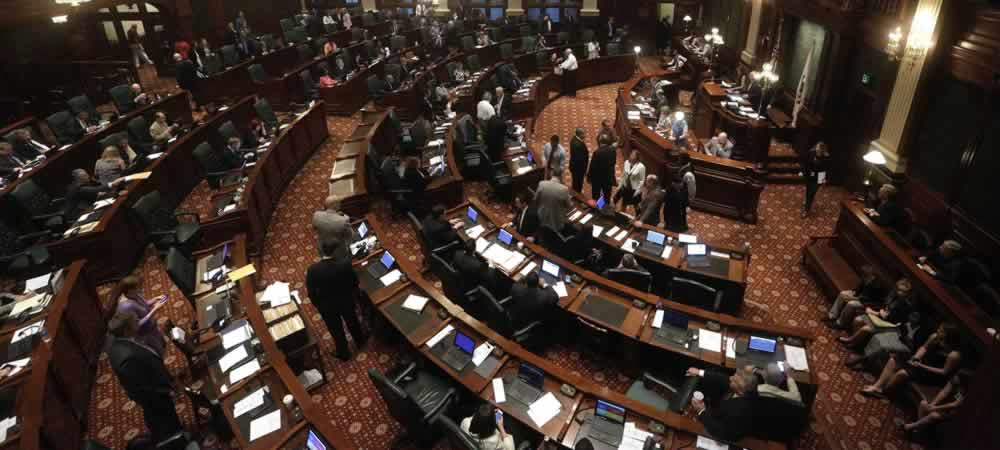- Legal Illinois sports betting has legs, but there are several obstacles to consider.
- IL HB 3308 would create the Illinois Sports Wagering Act and legalize both land-based and mobile sports betting.
- Other bills would also legalize betting but exclude collegiate wagering, online betting, and eSports wagering.
SPRINGFIELD, Ill. – In the rush to legalize sports wagering in Illinois, lawmakers are considering a number of different regulatory and licensing tactics. Some are more popular than others, but all have supporters and detractors.
The many different bills on the table were discussed last week on the Illinois House floor.
One of the seeming non-starters is a proposal that would adopt one-time licensing fees of $10 million per operator. Illinois Gov. JB Pritzker has already factored 20 such licenses into his 2020 budget proposal, which would immediately generate $200 million for the state.
That is, if all the licenses will be purchased right away. Pennsylvania, the only other state with such exorbitant licensing fees, still hasn’t sold all of their licenses, though that should change in the near-term.
Still, it will have taken Pennsylvania nearly a full year to sell all its sports wagering licenses, which is a factor to consider if the goal is for a rapid Illinois sports betting rollout.
This is not particularly encouraging, especially given that Pennsylvania is a much larger gambling market than Illinois. The two are ranked second and 11th in annual gaming revenue, respectively.
Another aspect of legal sports betting being debated in the Illinois legislature is mobile betting. Given numbers from other states showing that nearly four in five gamblers prefer sports wagering via mobile, this avenue of implementation has more unified support in Congress.
Rep. Michael Zalewski (D-Riverside) is the main sponsor of HB 3308, which is considered the bill with the most legs currently on the floor. The bill would create the Illinois Sports Wagering Act.
In explaining the import of mobile sports wagering in the grand scheme, Zalewski doesn’t mince words.
“We’ve become aware that states that don’t have a mobile piece don’t fare very well.”
That sentiment is echoed by Jake Williams of iDEA Growth, a sports wagering nonprofit. He told legislators on Thursday that Internet-based mobile sports wagering is “not only the future, it’s the now.”
According to Williams, if the sports betting black market is to be displaced, mobile is the only way.
“People are betting anyway, usually with illegal and offshore entities. Mobile betting offers consumers…a convenient way to place their bet[s] and ensures participants don’t continue to play through the black market. Through legalization and regulation of mobile sports wagering, we protect the consumer and the game and keep the money in the state.”
In order to have a chance to open customer-facing legal sports betting products to the Illinois public this year, legislation must be passed by the end of the 2019 session on May 31.
NCAA Wagering Could Be A Sticking Point
Of all the various issues brought forward during last week’s hearings, the most impactful likely came from Larry Lyons, AD at Illinois State University. He spoke on behalf of the 13 Division I colleges in the state.
“[Illinois colleges] are in agreement that we oppose legalized gambling on college sports,” said Lyons.
This argument is based on the common notion that young amateur athletes would be easier to undermine and control by scurrilous entities seeking to fix matches and rig event outcomes.
While there is no hard data on the actual risks involved, some states have banned the practice of wagering on NCAA sports altogether, while others have banned wagering on state-based collegiate events or state-based collegiate teams.
Still others have taken the approach of limiting the wager types available for college contests.
Of course, given the immense fanbase in Illinois for teams like the Fighting Illini, the Ramblers, and out-of-state teams like Notre Dame, eliminating college sports betting could be a major blow to the fledgling industry, driving bettors to other states as a matter of course.
eSports Is Bigger Than You Thought
The most interesting takeaway from last week’s legislative discussions was on the potential inclusion of eSports in the overarching wagering product.
Many states have barred eSports wagering, based primarily on the argument that video game betting could be an unhealthy and potentially addictive draw for minors.
States are generally reticent to pass any legislation that can be framed as targeting vulnerable youth in any outsize capacity.
However, according to Bob Greenlee of Tusk Strategies, eSports aren’t just for kids, and they’re much more popular than most of the media understands.
To drive home this point, Greenlee presented Illinois legislators with the shocking statistic that 2018 League of Legends World Championship tournament had over 205 million live viewers.
For the sake of comparison, the 2018-2019 Super Bowl had 100 million viewers. Even the highest-rated Super Bowl of all time – Super Bowl XLIX – had 114.4 million live viewers.
Certainly, many of these eSports viewers are children and teens, but many millions are also adults.
Banning wagering on these events could be a huge mistake financially, negatively impacting state coffers, area casino venues, and associated service industries alike.
Advertising Disclosure
In order to provide you with the best independent sports betting news and content LegalSportsBetting.com may receive a commission from partners when you make a purchase through a link on our site.
News tags: IL HB 3308 | Illinois | Illinois sports betting

Andy has been writing professionally for nearly two decades, with the last three years being dedicated to his primary passions: sports wagering news and gambling industry analyses. A walk-on punter, Andy has a particular interest in professional football, baseball, and horse racing betting. Come early May, you can always catch Andy – clad in all white, mint julep in hand – on Millionaires Row at Churchill Downs. In his dreams.


 College Football Betting
College Football Betting Best Online Sports Betting
Best Online Sports Betting Best Legal NFL Betting
Best Legal NFL Betting States With Legal Sports Betting
States With Legal Sports Betting Sports Betting Events
Sports Betting Events




